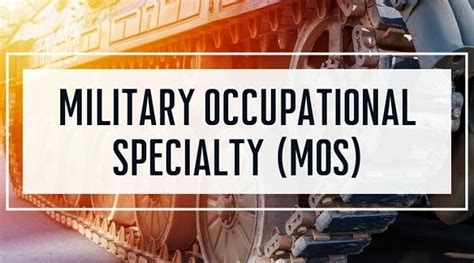Mos Military Occupational Specialty

The Military Occupational Specialty (MOS) is a critical component of the military’s personnel management system. It refers to the specific job or role that a service member is trained to perform within their branch of the military. In this article, we will delve into the world of MOS, exploring its significance, the various types of MOS, and the process of assigning MOS to service members.
Introduction to Military Occupational Specialty
The Military Occupational Specialty is a unique identifier that defines a service member’s job or specialty within the military. Each branch of the military has its own system of MOS, with the Army, Navy, Air Force, Marine Corps, and Coast Guard having their own distinct codes and classification systems. The MOS is used to identify the specific skills and training that a service member possesses, as well as the type of work they are qualified to perform.
Types of Military Occupational Specialty
There are numerous types of MOS, each with its own unique set of duties and responsibilities. Some examples of MOS include:
- Infantryman (11B): Responsible for engaging enemy forces, conducting patrols, and securing territory.
- Communications Specialist (25Q): Responsible for installing, operating, and maintaining communication systems and equipment.
- Medical Specialist (68W): Responsible for providing medical care and treatment to service members and civilians.
- Cybersecurity Specialist (17C): Responsible for protecting military computer systems and networks from cyber threats.
- Pilot (11X): Responsible for flying aircraft and completing missions.
The Process of Assigning Military Occupational Specialty
The process of assigning MOS to service members typically begins during the enlistment or commissioning process. Service members are administered a series of tests, including the Armed Services Vocational Aptitude Battery (ASVAB), to determine their aptitude and interests. Based on the results of these tests, as well as the service member’s personal preferences and the needs of the military, an MOS is assigned.
Once an MOS is assigned, the service member will undergo training to learn the skills and knowledge required for their specific job. This training may include classroom instruction, hands-on training, and on-the-job experience. After completing training, the service member will be assigned to a unit or organization where they will work in their designated MOS.
Importance of Military Occupational Specialty
The MOS is essential to the military’s personnel management system, as it allows the military to identify and utilize the unique skills and talents of each service member. By assigning service members to specific MOS, the military can ensure that each job or role is filled by someone with the necessary training and expertise. This, in turn, helps to maintain the military’s readiness and effectiveness.
In addition to its practical applications, the MOS also plays a critical role in the career development and advancement of service members. As service members gain experience and complete training in their designated MOS, they may be eligible for promotion or reassignment to more advanced roles. This can help to increase job satisfaction and retention, as well as provide service members with a sense of purpose and direction.
Challenges and Limitations of Military Occupational Specialty
While the MOS system provides many benefits, it also has its challenges and limitations. One of the primary challenges is the need for service members to adapt to changing circumstances and priorities. As the military’s needs evolve, service members may be required to take on new roles or responsibilities, which can be challenging and require additional training.
Another challenge is the potential for service members to become stuck in a particular MOS, with limited opportunities for advancement or career growth. This can lead to decreased job satisfaction and retention, as well as a lack of motivation and engagement.
To address these challenges, the military has implemented various initiatives and programs, such as the Army’s MOS reclassification program, which allows service members to change their MOS and gain new skills and experience.
Conclusion
In conclusion, the Military Occupational Specialty is a vital component of the military’s personnel management system, as it allows the military to identify and utilize the unique skills and talents of each service member. By understanding the different types of MOS and the process of assigning MOS, service members can better navigate their careers and make informed decisions about their future.
As the military continues to evolve and adapt to changing circumstances and priorities, the MOS system will play a critical role in ensuring the military’s readiness and effectiveness. By addressing the challenges and limitations of the MOS system, the military can work to provide service members with a sense of purpose and direction, as well as opportunities for career growth and advancement.
What is the purpose of the Military Occupational Specialty?
+The purpose of the Military Occupational Specialty is to identify and utilize the unique skills and talents of each service member, and to ensure that each job or role is filled by someone with the necessary training and expertise.
How is the Military Occupational Specialty assigned to service members?
+The Military Occupational Specialty is assigned to service members based on their aptitude and interests, as well as the needs of the military. Service members are administered a series of tests, including the Armed Services Vocational Aptitude Battery (ASVAB), to determine their aptitude and interests.
What are the benefits of the Military Occupational Specialty system?
+The benefits of the Military Occupational Specialty system include the ability to identify and utilize the unique skills and talents of each service member, as well as provide service members with a sense of purpose and direction. The system also helps to maintain the military's readiness and effectiveness.
What are the challenges and limitations of the Military Occupational Specialty system?
+The challenges and limitations of the Military Occupational Specialty system include the need for service members to adapt to changing circumstances and priorities, as well as the potential for service members to become stuck in a particular MOS with limited opportunities for advancement or career growth.



